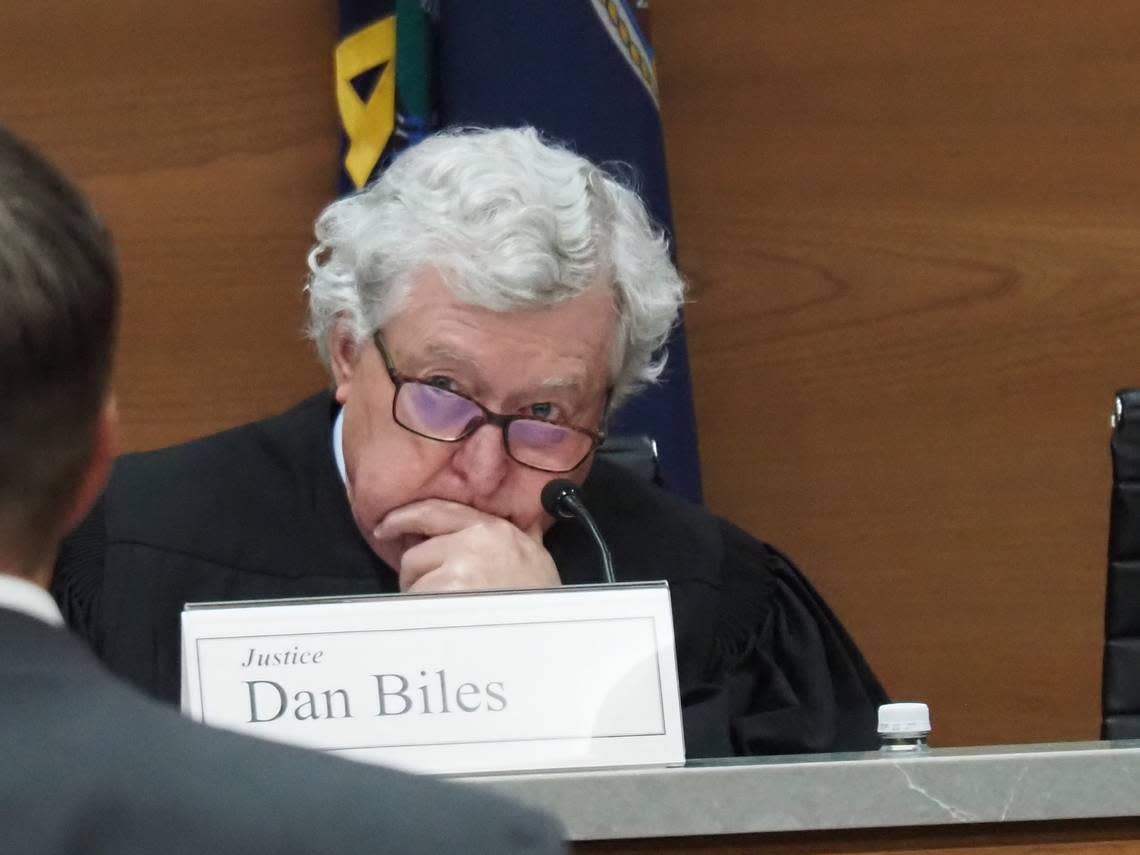Kansas justice reversed his recusal in major elections case. Kobach wants an explanation

- Oops!Something went wrong.Please try again later.
Kansas Supreme Court Justice Dan Biles, a 15-year veteran of the court, is participating in a potentially landmark case that could upend the state’s election laws after he had previously recused himself.
Kansas Attorney General Kris Kobach and Secretary of State Scott Schwab want an explanation.
The two Republican officials, in a motion filed on Monday by Kansas Solicitor General Anthony Powell, asked Biles to explain on the record his original decision to recuse himself and why he changed his mind. The request opens the possibility that one of the justices, typically a private group, will divulge information about their personal or private affairs.
The case is potentially monumental, involving laws on impersonating election officials and ballot collection and signature verification rules. The Kansas Court of Appeals earlier ruled that voting is a “fundamental right,” a decision that, if upheld by the Supreme Court, could dramatically constrain the power of the Legislature to enact voting or election restrictions.
The Supreme Court held oral arguments on Feb. 20. Chief Justice Marla Luckert on Feb. 19 issued an order rescinding Biles’ previous recusal, which he made in January 2023. The order says only that Biles “plans to participate” in hearing and deciding the case.
“Neither Justice Biles nor the Court offered any explanation for the decision to rescind the recusal,” Powell wrote in the motion. “Under both governing case law and the Code of Judicial Conduct, however, the litigants and the public were entitled to an explanation.”
Biles’ reentry into the case without offering an explanation “was improper, has the potential to compromise the public’s confidence in the integrity and impartiality of the Court, and creates at least an appearance of impropriety,” Powell wrote.
A spokeswoman for the Kansas Office of Judicial Administration said the court doesn’t comment on pending cases.
The case before the court was brought by the League of Women Voters of Kansas, Loud Light and other civic groups. In a response to the motion filed on Thursday, Topeka attorney Pedro Irigonegaray wrote the motion “is both made too late and is without merit.”
Irigonegaray noted that Biles also participated in oral arguments in November and that no one objected at the time.
“Defendants’ unjustifiably belated request threatens to further delay resolution of this matter. The Court should not allow litigants to engage in this type of eleventh-hour gamesmanship,” he wrote.
Appointed by Democratic Gov. Kathleen Sebelius in 2009, Biles is one of seven justices and third-most senior. It’s not clear whether his participation will alter the outcome of the case. Still, his presence may influence the final opinion even if it’s not decisive to the outcome.
During the Feb. 20 oral argument, Biles appeared to voice concern with a law targeting impersonation of an election official – a measure critics say is too broad and violates free speech rights.
Biles said the law appeared to make it possible for a person to be arrested for registering people to vote only to have those charges dropped later on. He compared the language to attempting to crush an ant with an atomic bomb.
“That has tremendous chilling effect on the speech,” he said. “A lot of trouble to go to to find out that what you did was correct.”
Kobach and Schwab’s motion came after J. Christian Adams, president of the conservative Virginia-based Public Interest Legal Foundation, wrote in a March 8 column in The Hutchinson News calling on Biles to offer an explanation.
“A problematic explanation would be his desire to break an apparent 3-3 split on the Supreme Court in the election case. Let’s hope Justice Biles has a different reason that doesn’t involve a thumb on the scales,” Adams wrote.

